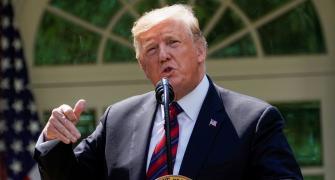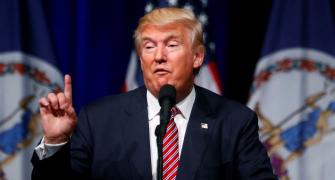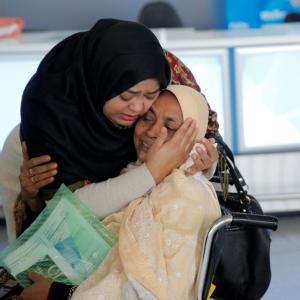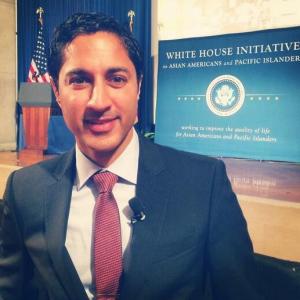'There's a lot of confusion. It started because the President's tweet was all-encompassing.'
'It has been watered down over the last few days though to more narrow classes of immigrants.'
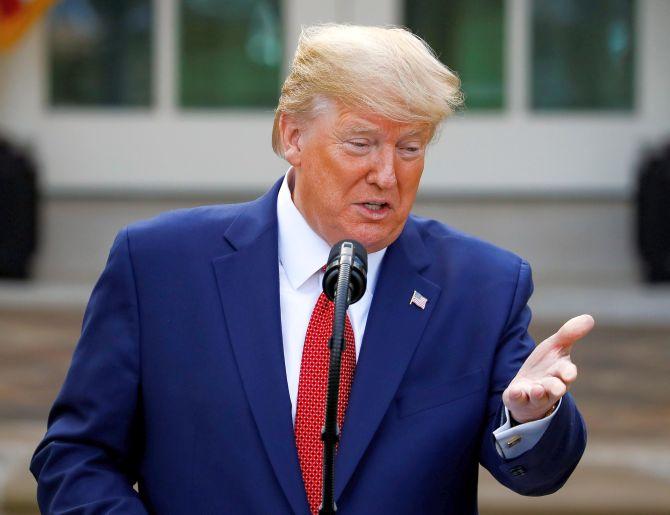
In his April 20th tweet, US President Donald J Trump promised a 60-days total ban on immigrants.
He argued that they threatened American jobs already at risk from the economic crunch coming from the aftermath of the COVID-19 outbreak.
Immigration attorney Kalpana V Peddibhotla tells Rediff.com Senior Contributor P Rajendran that the resulting proclamation on April 23rd slowly morphed over time to only exclude a subset of immigrants.
The administration kept its focus on what Trump terms 'chain immigration', targeting the families of citizens and permanent residents, most of who posed no threat to American jobs.
How does this proclamation from the President affect the family members of those on H-1B, L-1, B1 or other similar visas?
It doesn't affect non-immigrants such as individuals in the B, H, L, O category.
The proclamation, exempts numerous classes of immigrants, including non-immigrant workers such as H-1Bs and their families.
In our blog, we discussed (external link) the exemptions in detail.
For example, while the spouses and children of US citizens are not barred, the parents of US citizens are.
So are the spouses and children of lawful permanent residents (LPRs), the adult sons and daughters of US citizens and LPRs, and the siblings of US citizens.
Most of these family members have waited years sometimes as long as 20+ years, and thus this 60 day bar would impact anyone in the final stages of obtaining their immigrant visa.
Given that these categories have been targeted, it really begs the question as to how they are impacting US jobs by being admitted.
For example, it's hard to imagine elderly parents, 70 years and up, posing a threat to the US labour market.
And to the extent that the President is arguing that they may become a strain on our economic or health system, it's important to note that the adult US children sponsoring their parents are required to financially support them by 125% above the poverty guideline, and they must provide attestations of health insurance and evidence that they would not become a public charge.
While it is true that the President is also barring employment sponsored immigrants (the EB-1-3 categories) there are very few individuals that would actually fit this category.
Due to the nature of the petitioning process and the long back logs, most individuals that would be in these categories are already in the US, and thus not subject to the Proclamation, which seeks to limit immigration into the US as opposed to suspend immigration processing for people already in the US.
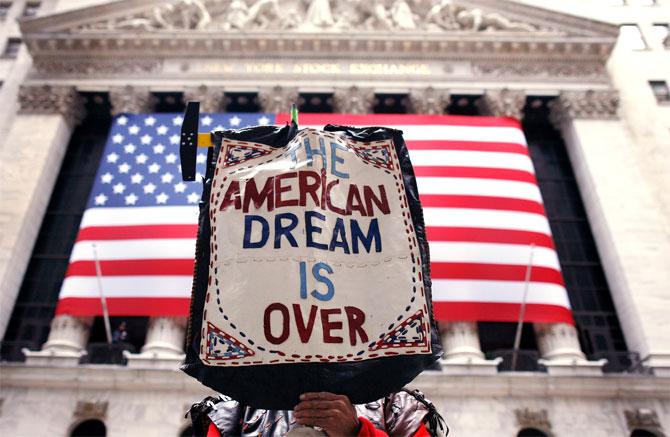
Going by historical precedent, do emotional factors also encourage Green Card holders to leave -- or discourage those on other visas from applying for it?
Here, there are two classes you may be referring to.
One of them consist of the H1-B workers-leaving because of the long backlog of applicants for permanent residency, or because of the constant roadblocks for continuing to pursue extensions of their H-1B status.
Yes, absolutely, I have seen people on H-1Bs other non-immigrant categories choosing to leave the US due to these obstacles.
I've been a lawyer for 21 years, and have practiced immigration law for 15 years.
I've seen how the barriers on US immigration has impacted not only my clients but also members of my own family.
People on these visas are going to Canada, the UK, Singapore, or even back to India.
Parents of US citizens who were deciding whether to move to the US and become permanent residents are saying they don't want to.
They are reading about how the US is becoming more anti-immigrant under President Trump.
They fear how they will be treated if they were to move here.
It is already difficult for their children to convince them to move and leave behind their lifestyle and friends and when they see the negative immigrant attitudes being expressed in the US, it becomes even more difficult to be persuaded to leave India.
That was not always the case before. Today, they fear they will be treated poorly, whether that is true or not.
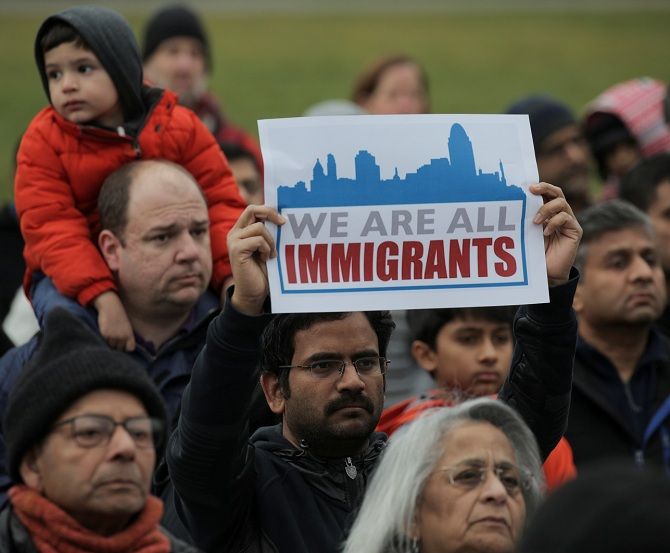
You said that the proclamation "appears to be a stepping stone to pursuing an anti-immigrant agenda." Are there legal steps being taken to counter this order? If so, how likely are they to be successful?
This ban seems to truly be untethered to the US labour market and instead seems to be testing the waters for reducing family reunifications which this Administration terms as "chain migration."
There is likely to be litigation that arises from this especially given the arbitrary nature of the Proclamation.
Most likely, the complainants will pursue injunctive release in a US federal district court, seeking a restraining order against the Proclamation.
However, it a case is filed and eventually gets to the Supreme Court, given the makeup of the court, and its decisions over the Administration's prior travel ban, the Proclamation will most likely be upheld.
What is most concerning though for immigration advocates is whether the Proclamation will be extended and potentially extended to other immigrant classifications.
As you've suggested, the actual Proclamation, arising originally from President Trump's tweet, does not suspend all immigration, just a subset of it. Would an all-out ban have been hard to defend in the courts?
I don't know. It's unprecedented. They have not done it even in previous pandemics, or even world wars.
In prior administrations, though Republican and Democratic presidents alike have invoked partial bans on immigration, that's usually correlated to existing political conflicts.
Could future executive orders begin to target Green Card holders and even citizens, given that just two months ago the Department of Justice set up a Denaturalisation Section to target 'terrorists, war criminals, sex offenders, and other fraudsters'.
The President has some plenary powers to control borders. That's different from what happens within the US.
The denaturalisation procedure is already on the books. If you were a Nazi and lied about it, you can be denaturalised.
The president's power for restricting the entry to the US of immigrants and non-immigrants comes from the Immigration and Nationality Act Sec 212 (f).
What do these measures -- not just the proximate cause -- mean for the Indian-American community?
There's a lot of confusion.
It started because the President's tweet was all-encompassing. It has been watered down over the last few days though to more narrow classes of immigrants.
But because of the confusion created by President Trump's initial pronouncements, questions are coming from everybody -- those on H1, L1, etc.
This confusion is not limited to the Indian community.
The first person who contacted me was asking about a German spouse already in the US.
This has raised concerns for immigrants from all backgrounds.
But the proclamation is limited to only 60 days.
That's correct, and to that extent there's also the question as to why it was done in the first place, especially given that US consulates are closed abroad and travel is restricted.
What's concerning though is that the Proclamation has left open the possibility of extending and expanding it.*
(*According to Section 6 of the proclamation, 'Within 30 days of the effective date of this proclamation, the Secretary of Labor and the Secretary of Homeland Security, in consultation with the Secretary of State, shall review nonimmigrant programs and shall recommend to me other measures appropriate to stimulate the United States economy and ensure the prioritization, hiring, and employment of United States workers.)
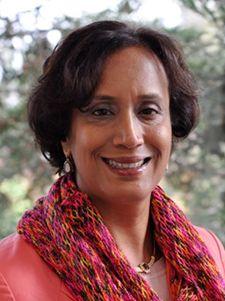
Why has President Trump suddenly made this proclamation? Does it actually achieves the intended goals?
My understanding is that when he tweeted this, he was planning to halt US immigration to stop the invisible enemy (COVID-19).
The President came into office with an intended goal of stopping illegal immigration, but once in office he has significantly stifled legal immigration through a series of Executive Orders, administrative policies, and stricter scrutiny of petitions.
In that sense, rather than building a great big wall as he promised, he has erected an 'invisible wall'. In my opinion, this Proclamation, is simply a furtherance of his intentions to reduce immigration to the US.
I make this assertion based upon the erratic nature in which this Proclamation evolved -- moving from an all-out ban on immigrants, to potentially targeting temporary workers such as H-1Bs, to eventually targeting families.
It seems arbitrary in scope, and as a practical matter unlikely to meet any of the President's stated rationale for issuing it.

